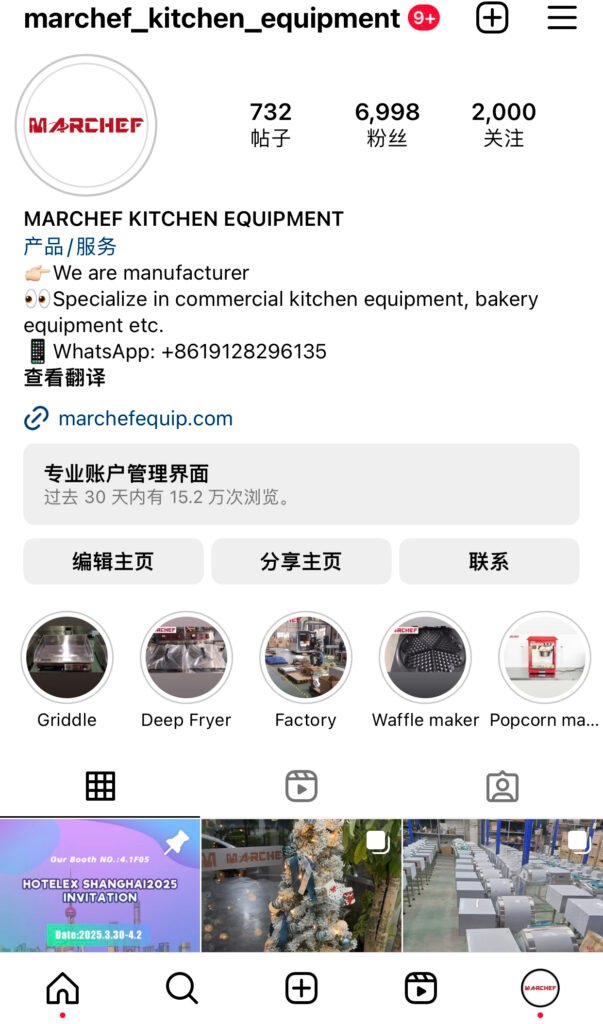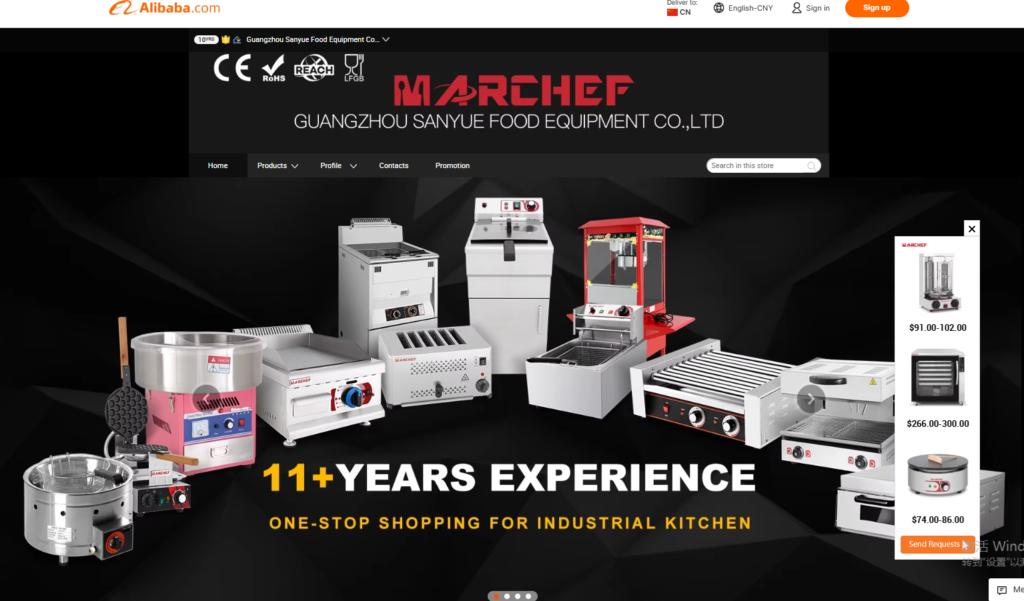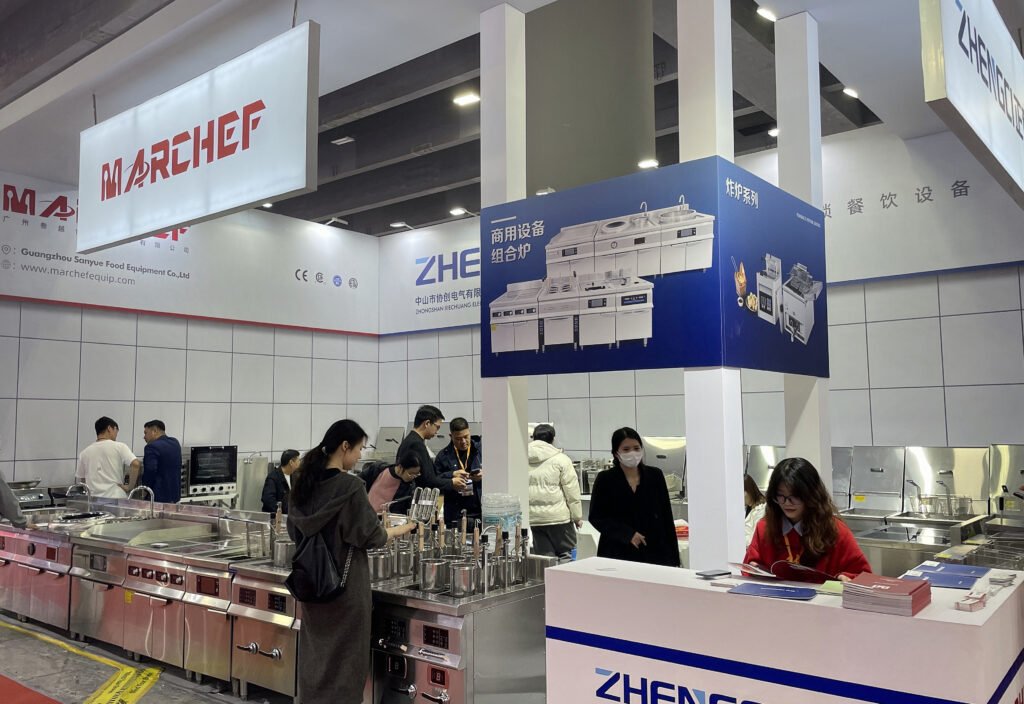If you plan to start selling hotel kitchen equipment locally one day, then finding a high-quality and stable supplier is the first step to start your business.However, with countless suppliers available globally, the process can feel overwhelming.
In this article, we will provide you with 4 mainstream channels for finding suppliers in the industry, analyze their respective advantages and disadvantages, and guide you to find the most suitable channel.
Search engines
Search engines, such as Google, Yahoo, Yandex, etc., are the basic means of finding kitchen equipment suppliers. By entering product keywords and target countries and regions through search engines, you can quickly find relevant supplier information.

Advantages:
- Wide information: Search engines can provide a lot of supplier information. If you are looking for international suppliers, search engines can easily help you find suppliers around the world and expand your selection range.
- Quick and convenient: Using search engines is very fast. Just enter relevant keywords and you can quickly get the supplier’s web page, contact information, product information, etc., saving time and effort.
- Price comparison: Through search engines, you can easily view the prices of multiple suppliers and compare them to find the most suitable quotation. This is especially important for buyers with limited budgets.
- User reviews: Many supplier websites have user reviews and ratings, which can help you understand the real experience of other buyers and reduce the risk of selection.
Disadvantages:
- Too much information: Search engine results may show a large number of irrelevant suppliers or information, which will greatly increase your screening time. Without accurate screening criteria, it is easy to get lost in the ocean of information.
- Supplier quality is difficult to evaluate: Many suppliers’ online information and publicity do not always reflect their actual service and product quality. Suppliers on some websites may use false advertising to attract customers.
- May lack after-sales guarantee: Suppliers found through search engines may be online merchants, and most of them do not have physical stores. In some cases, after-sales service may not be perfect, and issues such as returns, exchanges, or repairs are more complicated to handle.
- May have hidden costs: Many suppliers may advertise prices on their websites that are only basic prices, and subsequent shipping costs, installation costs, or other additional costs may not be clearly listed. You need to ask carefully before purchasing.
- Advertising interference: In the search engine results page, some suppliers may rank high through paid promotion, resulting in the drowning of real and high-quality supplier information in natural searches. Buyers may prefer to click on the promoted suppliers, but this is not necessarily the best choice.
Summary:
Finding kitchen equipment suppliers through search engines is a very efficient way, but it also requires certain screening skills to avoid being misled by a lot of information and false advertising. You can reduce risks by checking other customers’ reviews and carefully verifying the supplier’s qualifications and commitments. If possible, it is best to visit the site or verify its credibility through third-party channels.
Social Media
Facebook, Twitter, LinkedIn, Instagram, and other social media are also some of the ways to find industrial kitchen equipment suppliers. You can post demand information through social media platforms, or browse the supplier’s dynamics on social media to find the right supplier.

Advantages:
- Wide information acquisition: Social media platforms provide a wealth of supplier information and user feedback. Posts, comments and joining various related groups can help you quickly understand the market situation, which is efficient and convenient.
- Real-time interaction: Ability to communicate with suppliers in real time, quickly answer questions, and obtain more product information and quotes.
- Visual display: Many suppliers share product pictures and use cases on social media to help customers understand product performance and application more intuitively.
Disadvantages:
- Information overload: The huge amount of information on social media may make it difficult to filter out truly valuable supplier information.
- Authenticity: Some pictures, videos and comments may be false or untrue, making it difficult to judge the actual capabilities and product quality of the supplier.
- Lack of professionalism: Discussions on social media may lack professionalism, and the information obtained is usually not in-depth and accurate compared to face-to-face conversations.
- Privacy and security issues: There may be risks of privacy leakage when communicating on social media, especially when sharing sensitive information.
- After-sales service is difficult to guarantee: Suppliers contacted through social media may not be as reliable as traditional channels in terms of after-sales service and support.
Summary:
Looking for kitchen equipment suppliers through social media can quickly obtain information and make comparisons, but you should also be cautious about the authenticity and professionalism of the information. It is recommended to combine other channels for comprehensive evaluation to make a more informed purchasing decision.
B2B e-commerce platform
You can find kitchen equipment manufacturers on B2B platforms such as Alibaba, Made-in-China, and Global Sources.

Advantages:
- A wide selection of suppliers: These platforms bring together suppliers from all over the world. You can find various brands and types of kitchen equipment, whether small kitchen equipment or large commercial kitchen facilities, to meet your different purchasing needs.
- Convenient price comparison: On B2B platforms, you can easily browse price information from different suppliers and make horizontal comparisons. For international buyers, the platform usually provides multilingual support to make communication smoother.This provides a clear price comparison for bulk purchases and helps to find cost-effective suppliers.
- Communicate directly with suppliers: Through the platform’s chat function (such as Alibaba’s instant messaging), you can directly contact suppliers to learn about product details, get quotes, negotiate discounts, or negotiate after-sales service terms. This not only saves intermediary fees, but also allows you to gain a deeper understanding of suppliers.
- Transaction guarantee: Most B2B platforms have a supplier certification system (such as Alibaba’s “Gold Supplier” certification), which can provide you with some trust guarantees and help you screen out more reliable suppliers. You can also learn about other buyers’ purchasing experience through the user evaluation system on the platform.
- Provide value-added services such as logistics and transportation: Many B2B platforms provide value-added services such as international payment, logistics, and customs clearance. These services can greatly simplify the process of cross-border procurement, saving buyers a lot of trouble.
- Low threshold and flexibility: You can choose suitable suppliers according to your budget and needs. The platform usually has no strict restrictions on bulk purchases, allowing small-volume purchases, and you can also communicate directly with suppliers for customization.
Disadvantages:
- Quality is difficult to verify directly: On B2B platforms, although there are certifications and customer reviews, it is difficult to verify the actual quality of the product before purchase because you cannot directly access the equipment. The quality of many products can only be judged through communication with suppliers and feedback from other customers, which may involve certain risks. Even for certified suppliers, some equipment may not be consistent with the actual situation.
- Insufficient after-sales guarantee: Although some platforms provide basic after-sales support, the after-sales service on B2B platforms may be relatively weak compared to physical stores or local suppliers, especially for large equipment. If there is a problem with the equipment, cross-border or cross-regional repairs and returns will be relatively complicated. Some small suppliers may not have a complete after-sales service system, and the problem-solving cycle is long.
- Potential risk of supplier fraud: Although B2B platforms will conduct certain audits and certifications on suppliers, there is still a risk that some bad merchants will defraud orders through false propaganda. For merchants with poor reputation, it is difficult for buyers to effectively identify whether they are reliable.
- Large price fluctuations: Sometimes the supplier’s quotation is not fixed, especially when purchasing in bulk, the price may fluctuate greatly due to factors such as order quantity, payment terms, and transportation distance. You need to be very careful when negotiating to ensure that you will not be charged unnecessary fees.
- Uncertain logistics costs and time: The logistics costs and time of cross-border purchases are often opaque, especially when purchasing from overseas, the transportation time may be longer, and the damage and loss during transportation are more troublesome to deal with. In addition, international transportation may involve complex customs clearance issues, which buyers need to understand clearly in advance.
- Risk of counterfeit and non-branded products: Although B2B platforms have some certified suppliers, there are still some low-quality, counterfeit kitchen equipment circulating in the market. These equipment may not meet the formal certification standards, have a short service life, and may even have safety hazards.
Summary:
Finding kitchen equipment suppliers through B2B e-commerce platforms has many advantages and is very suitable for buyers with bulk purchases and diversified needs. However, you also need to be wary of potential quality and after-sales risks on the platform. To reduce risks, it is recommended to choose suppliers with good reputation and certification, and to verify their qualifications and product quality through multiple channels.
Industry exhibitions and fairs
You can also find suitable kitchen equipment manufacturers by participating in internationally renowned catering equipment exhibitions such as Host Milano, The NAFEM Show, Hotelex Shanghai, etc.

Advantages:
- Direct contact with suppliers and products: At exhibitions and fairs, you can communicate directly with suppliers face to face to understand the actual situation, functions, technical parameters and quality of the products. You can touch and operate the equipment on site to feel its quality and use experience, which is more intuitive than browsing pictures and videos online.
- Learn about the latest industry trends and technologies: Exhibitions and fairs usually showcase the latest technologies and innovative products in the industry. You can learn about some high-end products that have not yet been launched, or even customized solutions. When attending exhibitions, there are usually industry experts, technical lectures, etc., which can help you grasp the development trends of the industry and make more informed purchasing decisions.
- On-site negotiations and customized services: On-site negotiations with suppliers are more flexible, and details such as price, contract terms, payment methods, and after-sales services can be discussed face to face; if there are specific needs, face-to-face communication can be used to allow suppliers to quickly clarify your specific needs and ensure that the products meet the requirements.
- Establish long-term partnerships: Exhibitions and expositions provide a good platform for establishing partnerships. Face-to-face communication with suppliers can enhance mutual understanding, effectively build trust, and help establish long-term and stable partnerships, especially when it comes to high-value purchases.
- Save time and energy: By participating in exhibitions, you can contact suppliers from all over the world in a short period of time, saving a lot of time for online searches and contacts. You can negotiate with multiple suppliers in one day, which greatly improves efficiency.
- On-site offers and discounts: Many suppliers will offer special discounts or promotions during the exhibition. Since the exhibition attracts a large number of buyers, suppliers usually hope to attract more orders through some preferential policies.
- Understand competitors and market conditions: By participating in exhibitions, you can not only understand the products of suppliers, but also see the products and market strategies of competitors. This is very helpful for you to evaluate the competitiveness and market positioning of your own company.
Disadvantages:
- High time and cost: Attending an exhibition requires a certain amount of time and cost, including exhibition tickets, travel expenses, accommodation expenses, etc. If your location is far away from the exhibition venue, the cost of business trip will be very high.
- Exhibition information may be limited: Although you can directly see products and communicate with suppliers at the exhibition, the types of products displayed at the exhibition are usually limited, and the products displayed may only be some representative or popular products, which cannot cover all kitchen equipment options.
- Supplier quality and reputation are difficult to verify quickly: Although face-to-face communication is possible, it is difficult to fully evaluate the overall quality and service level of the supplier in a short period of contact. Some suppliers may exaggerate the advantages of their products or fail to give a complete after-sales service commitment.
- Fierce competition and difficult selection: Large exhibitions usually attract many suppliers to compete on the same stage, which may lead to information overload, especially when there are many suppliers, it may become difficult to select the right supplier. You need to quickly screen out suppliers that meet your needs during the exhibition, otherwise it is easy to get lost in many booths and waste a lot of time.
- Unable to test equipment in the short term: Although you can see and operate the equipment on site, due to the limited exhibition time, you cannot conduct in-depth long-term testing or use, and cannot fully evaluate the stability, durability and long-term performance of the equipment. The complex functions of some equipment require longer operation and testing, which is difficult to do during the exhibition.
- Over-reliance on exhibitions to screen suppliers: If you rely too much on exhibitions to screen suppliers, you may ignore the supplier resources obtained through other channels (such as B2B platforms, network recommendations, etc.). This may lead to a limited range of suppliers and miss more potential excellent suppliers.
Summary:
Finding kitchen equipment suppliers through industry exhibitions and expositions has obvious advantages, especially in face-to-face communication, on-site product experience and acquisition of new industry technologies. However, exhibitions also have some limitations, such as high time cost, difficulty in fully verifying supplier quality, and limited selection range. Therefore, the best practice is to use exhibitions as part of supplier screening and combine them with other channels (such as B2B platforms, user reviews, third-party recommendations, etc.) to make more comprehensive and accurate purchasing decisions.
